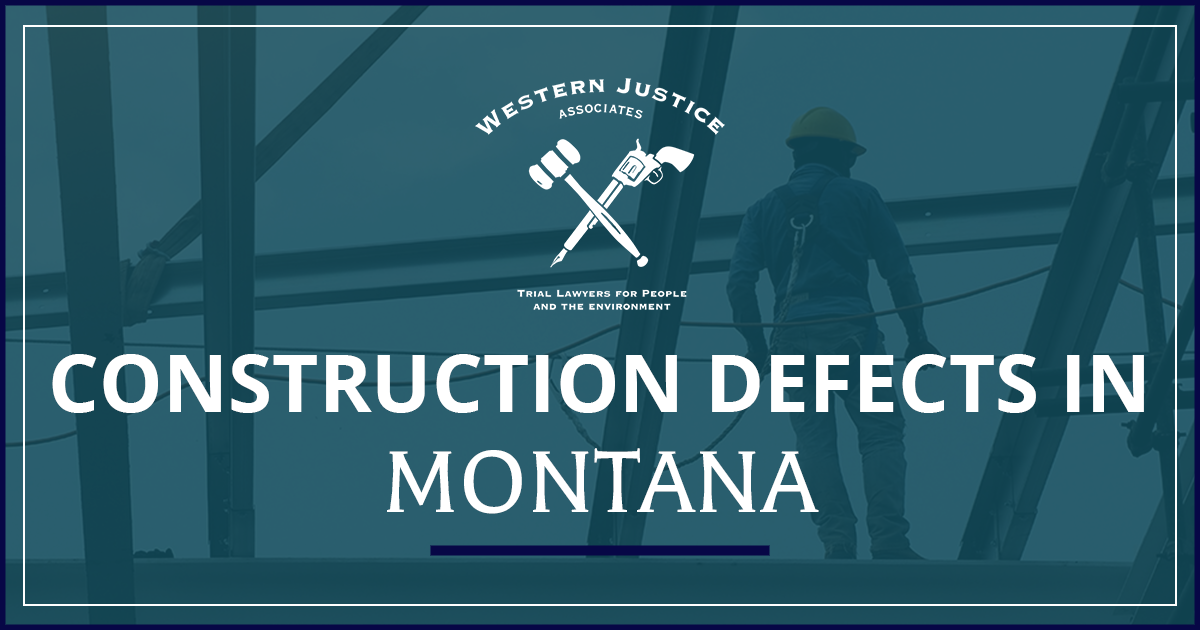Construction Defects in Montana
When home or business owners invest their hard-earned money into purchasing property along with a home or office building or decide to have it renovated, they expect those that they hire to employ the best practices, including adhering to current Montana building codes, using the best quality materials that they’ve requested, and having the most competent contractors perform the work.
Unfortunately, this doesn’t always happen, and adverse outcomes, such as mold and mildew issues, electrical fires, foundation concerns, and more, occur.
And, as you’re aware, if you’ve had to personally deal with one of these issues, addressing construction defects in Montana is often time-intensive and costly. If you need to rebuild from the ground up, it’s even more so.
Our legal team at Western Justice Associates, PLLC holds negligent builders and contractors accountable for their wrongdoing, and we want to help you, too. Let’s sit down and discuss the issues you’re facing with your construction crew, and we’ll go over rights and how we might be able to help.
That initial case review meeting comes at no cost to you.
Why Building Contractors Face Defect Claims
There are many reasons why contractors face construction defect allegations. They generally fall into one of the four following categories:
- Design defects: These stem from engineers or architects creating ineffective designs which builders should go by. For example, a blueprint or plan may ineffectively route water around a property, resulting in it getting under a home’s foundation, causing eventual issues with sinking, or their design might not call for enough structural supports to shoulder the weight of the roof constructed of certain types of materials.
- Use of substandard building materials: A contractor has an obligation to use the right materials for the job, which means ones that are in good condition, of high quality, and appropriate for their intended use. Also, if they list themselves as using certain materials in their contract or a customer requests an upgrade that they agree to, a builder must not switch out those materials to something inferior without the consent of you, the consumer. A construction company’s acquisition and use of inferior building materials, including damaged or defective ones, could lead to unexpected consequences for their customer over time.
- Construction defects: These may result from the installation, operation, or maintenance of a particular element or feature. It’s important to know that a defect like this isn’t always immediately apparent, but its existence (and the impact it has caused) may become clearer over time. One example of this is a leaking pipe that isn’t discovered early on, but by the time it is, a contractor has determined that it has caused foundation issues.
- Code violations: Licensed contractors and construction companies have obligations to keep up with ever-changing building codes. If they fail to do so and perform work to an earlier standard, something unexpected may occur that puts a building owner or homeowner and their guests at risk of injury and also results in significant damage to the property.
Steps To Take if You Identify a Problem
It’s always in your best interest to make every possible effort to amicably resolve your differences with a building contractor before making it a legal matter.
One of the most important pre-litigation steps you may want to attempt to pursue before getting a law firm like ours, Western Justice Associates, PLLC involved includes notifying the construction company of the flaws you’ve noticed and allowing them to inspect and remedy the issue.
If resolving your differences with a builder just between the two of you doesn’t work, you may want to review your contract with them to see what the terms and conditions say about what your next course of action has to be.
Keep in mind each contract is written differently, but in our experience, most include an alternative dispute resolution (ADR) clause, requiring parties to pursue mediation or arbitration to resolve their differences when other approaches have failed and before initiating litigation.
Should a contract call for ADR and it not prove fruitful in helping you attain a resolution, litigation may be your next best course of action.
If so, you’ll want an attorney who regularly handles cases involving construction defects in Montana to assist you in determining if you have a viable claim based on one of the following or something else:
- Breach of contract
- Breach of express or implied warranty
- Negligence
- Strict liability
Should the nature of your claim fall into one of the above-referenced categories and no other efforts called for in your contract have proven successful, your legal representative will likely advise you that pursuing litigation is your next best option.
The Statute of Limitations That Applies to Construction Defect Cases in Montana
Should a lawyer deem you to have a valid construction defect claim under one of the causes of action above or some other one, they’ll next assess whether you’re still within the statute of limitations for taking legal action.
Montana Code Annotated (MCA) 27-2-208 outlines how our state has a 10-year statute of repose that applies to construction defect cases. That same statute also clarifies how “injuries” occurring during the tenth year must be brought within a year of their occurrence.
It’s important to note that when it comes to new construction in our state, while certain structural elements are covered for up to 10 years, only a 1-year warranty applies to their mechanical systems, materials, and workmanship. Other Montana laws may apply, depending on the nature of the construction defect, that may affect how long you have to file a claim or lawsuit.
Your failure to take action without those timelines may forever eliminate your ability to do so. Thus, we strongly urge you to seek out legal counsel as soon as you’ve identified flaws with your building so you can learn specifically what statute applies in your case.
Damages You Can Recover in Defect Cases
You might be able to demand compensation for some of the following after identifying a property is defective:
- Relocation fees, including the cost of temporary housing and storage
- Repair costs
- Paid expert fees (for those to verify a defect exists)
- Loss of market value
- Injury-related costs (if anyone suffered physical or mental harm due to the dangerous or defective conditions)
- Loss of income
Additionally, you may be able to recover other types of compensation for your losses, which an attorney will discuss with you during your initial consultation.
Getting Guidance in Handling a Dispute with Builders
You took your time to carefully vet different contractors, checking their licenses, references, reviews, and other information to minimize the chances of “surprises” occurring, yet someone dropped the ball and didn’t do what was expected of them.
Now you’re in a situation where a builder is passing the buck, saying that they’re not responsible for what happened that posed an environmental risk like a fire, and a subcontractor is instead or maybe just ignoring your calls, hoping you’ll give up in trying to reach them and leave them alone.
You shouldn’t continue living in an unsafe house or working in a dangerous building that could put your life or the lives of others at risk.
Also, know that your property could also sustain further damage by leaving the defects it does have unaddressed, causing a devaluation of it or further defects to occur. These are just some of the reasons you don’t want to let the filing timeline that applies to cases like these come and go without taking action.
So, reach out to us at Western Justice Associates, PLLC to discuss your potential case so an attorney who regularly takes on cases involving construction defects in Montana can guide you in understanding our state’s laws and the rights they afford you in these situations.









